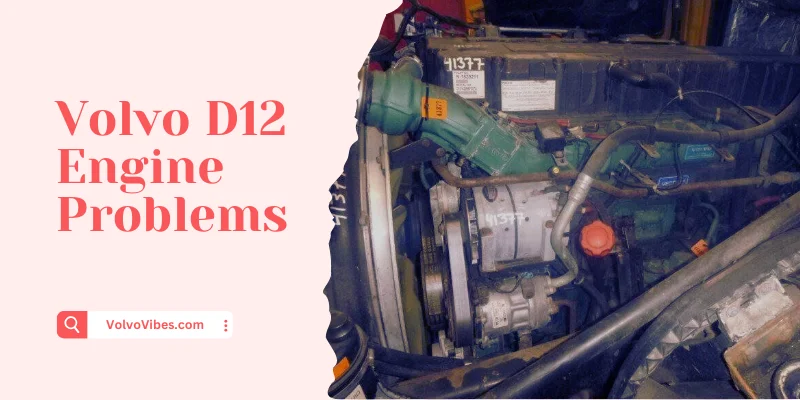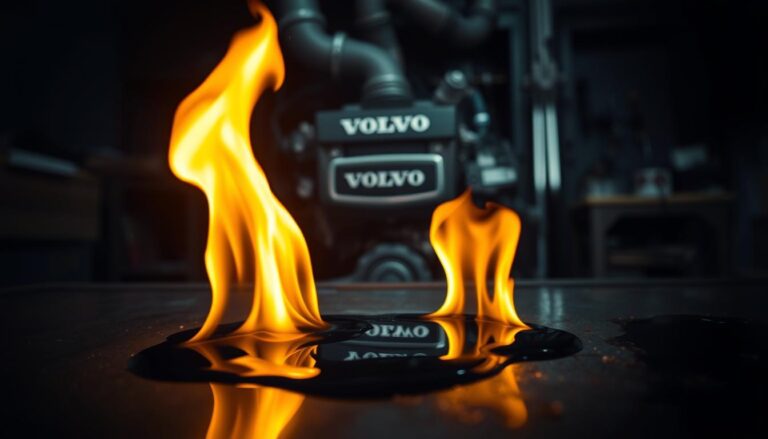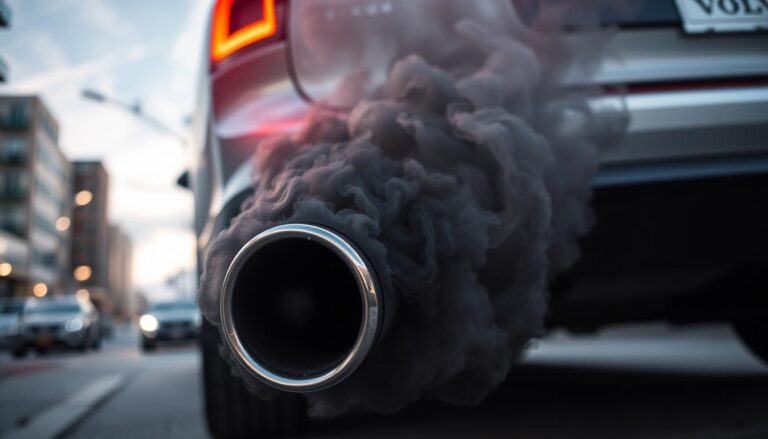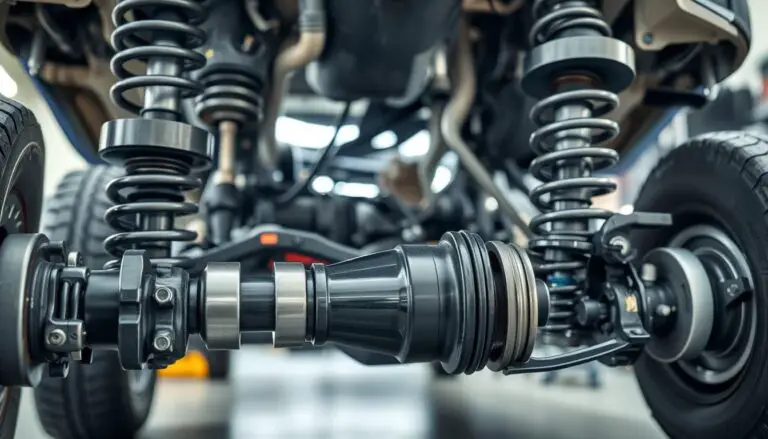Volvo D12 engine problems may include oil leaks, increased fuel consumption, smoke emissions, overheating, fuel pressure problems, transmission-related issues, ECM failure, piston problems, fuel injector issues, and the risk of complete engine failure.
However, keep in mind, that most of these issues are universal to other engines as well, not just Volvo d12. Also, it’s worth noting that most of the time, these problems stem from routine wear and tear. Something that could be avoided with regular maintenance and careful operation.
In this guide, I am simply shedding light on these common problems without casting any shadows on the overall engine quality.
Common Volvo D12 Engine Problems & The Parts Responsible

Let’s explore some of the most common Volvo D12 engine problems and the associated components responsible for these issues.
Reason #1: Engine Performance Degrade Due To Persistent Oil Leaks
If the V12 engine has drastically lost its performance and you’ve continuously found components to be worn out even after not-so-long replacement, this could be a strong sign of oil leaks. Multiple components can be responsible for this.
1.1 The Oil Cooler
Seal issues in the oil cooler can cause leaks. The degradation of the components as well as the existence of corrosion can lead to leaks issues in the Volvo d12 engine.
1.2 The Valve Cover Gasket
Oil leaks can also stem from damaged and compromised valve cover gaskets. After a certain period, the gaskets are prone to wear out and require replacement to avoid severe engine failure and misfire risks.
Not taking quick action to fix oil leaks can result in complete engine failure sooner or later. So, you must act fast for this particular issue with the Volvo D12 engine.
According to expert technicians of Benjin Motor Works, the critical concern of serious fire arises when there are oil leaks in the engine compartment. This can lead to extensive and dangerous engine failure.
Also, addressing Volvo d12 engine concerns with oil leaks may relate to not using the right amount of oil. Yes, overfilling can cause leaks as well.
Preventive Measures and Solutions:
- Regularly check and replace worn-out gaskets.
- Monitor the oil cooler for seal degradation or corrosion.
- Upgrade gaskets and seals for enhanced durability.
- Adopt regular oil level checks to address leaks promptly.
Reason #2: Increased Fuel Consumption
A sudden increase in fuel costs and poor fuel efficiency in the Volvo D12 engine can be linked to issues in various components.
2.1 Clogged/Damaged Fuel Filters
Blocked or damaged fuel filters are significantly responsible for impacting fuel efficacy. Avoiding regular checks and prompt replacements of fuel filters are key reasons.
2.2 Turbocharger & EGR
Leaks, clogs, or malfunctions in the turbocharger and Exhaust Gas Recirculation (EGR) system can contribute to higher fuel consumption of the Volvo d12 engine. The parts are prone to causing significant engine damage if professional assistance is not taken into account quickly.
2.3 Coolant Temperature Sensor
Malfunctioning coolant temperature sensors are highly doubted components that can contribute to disrupting fuel mixture. Damage to these sensors can degrade fuel efficiency.
2.4 Under-Inflated Tires
Improperly inflated tires create rolling resistance, leading to higher fuel consumption.
2.5 Fuel Pump Leaks
Fuel pump leaks mean a waste of fuel and an overall reduction of efficiency. This can soon turn into a potential safety hazard.
These are some of the most common culprits behind the Volvo D12 engine suffering from excessive fuel consumption. Keep In Mind, that the high fuel consumption can be a result of a degraded engine itself.
A report from Financial Express suggests that engine degradation can heavily impact the fuel economy of vehicles, resulting in higher consumption of fuel. So perhaps, you might need to think about a costly engine replacement. In the long run, the fuel economy is going to make you pay a big amount anyway.
Preventive Measures and Solutions:
- Regularly change fuel filters.
- Clean or replace fuel injectors.
- Use high-quality fuel additives.
- Inspect fuel lines, injector seals, and connections for leaks.
- Address turbocharger and EGR issues promptly.
- Maintain proper tire inflation.
Reason #3: Smoke Emission Issue With Volvo D12
Visible smoke indicates one of the top challenges with the Volvo d12 engine, excessive emissions. This is often related to the following components.
3.1 Piston Rings
Worn-out piston rings contribute to blue smoke. This indicates unburnt fuel after combustion. Using the wrong grade/type of oil can be a potential cause as well. Very rarely, oil thinning takes place due to fuel entering. This makes the oil pass the rings. Along with piston rings, damaged valve guides and valve seals can also cause issues.
3.2 Turbocharger
Malfunctioning or damaged turbochargers can lead to black or white smoke emissions.
3.3 Damaged Air Cleaners
Usually due to damaged or dirty air cleaners, some unburnt fuel remains after combustion. This can result in combustion and black smoke or white smoke from exhaust. Poor cylinder compression, problematic fuel injection timing, and disruptive coolant entering the cylinders can further contribute to white smoke leaks.
3.4 EGR Valve
This is also quite common for degrading and causing black smoke issues in Volvo d12 engines.
Preventive Measures and Solutions:
- Blue smoke sometimes requires engine compression along with dyno testing.
- Regular checking and replacing air filters responsible for appropriate airflow.
- Damages and leaks in the Turbocharger require attention.
- Cleaning/replacing PCV valve and hose when worn out.
- If nothing works out, a thorough piston ring inspection by a professional is highly recommended.
Reason #4: Severe Overheating Problems
One of the common hurdles for Volvo d12 engine owners has to be overheating. Some obvious signs are an increased temperature gauge, visible smoke from the hood, and a burnt coolant smell.
Also, you may experience the truck completely shutting down the engine after the overheating. It can be attributed to several components:
4.1 Damaged Engine Fan
A damaged engine fan is the most common reason behind the overheating issues of the Volvo d12 engine.
4.2 Faulty Temperature Sensor
Due to additional load and different climates driving, the temperature sensors can face failure leading to overheating.
4.3 Thermostats
Partially closed thermostats can cause overheating problems as well.
4.4 Clogs in CAC and Radiator
Blockages in the charge air cooler (CAC) and radiator can contribute to overheating.
4.5 Water Pump Failure
A failed water pump can result in inadequate cooling, leading to overheating.
Keep In Mind – Make sure you are not dealing with engine challenges in Volvo d12 trucks due to bad driving practices. Putting too much strain on the engine is a quite common reason behind overheating.
Preventive Measures and Solutions:
- Regularly check the engine fan.
- Replace faulty temperature sensors.
- Ensure thermostats are fully open.
- Perform regular radiator flushes.
- Test and replace a failed water pump.
Reason #5: Problematic Fuel Pressure in Volvo D12
The pulse width module voltage system of modern fuel pumps is responsible for quick and random pressure changes in engines.
Now this could be both good and bad news.
The system helps eliminate noise and extend the Volvo d12 engine life by allowing a controlled operation of battery voltage. But at the same time, it causes rough pressure distribution in the injector, rail, and pump.
This can lead to inconsistent fuel flow, unburnt fuel existing in the engine, and reduced fuel economy. Issues with fuel pressure in the Volvo D12 engine often involve the following components:
5.1 Damaged Fuel Pressure Regulator
Leaks in the fuel pressure regulator can lead to inconsistent fuel flow and reduced fuel economy.
5.2 Faulty Fuel Pump
Irregular pressure from a damaged fuel pump can result in unburnt fuel in the engine.
5.3 Damaged Fuel Injectors
Dirty or faulty fuel injectors may cause irregular pressure and hinder proper fuel distribution.
Preventive Measures and Solutions:
- Regularly check for fuel pressure regulator leaks.
- Listen for irregularities in the fuel pump during acceleration.
- Clean or replace fuel injectors as needed.
Reason #6: Volvo D12 Engine Transmission Related Problems
Not all transmission issues with Volvo trucks relate to the engine. However, some are particularly responsible for causing performance degradation of the truck’s main component. These are:
6.1 Coolant, Radiator, Hose, Water Pump
Having coolant leaks, malfunctioning radiator, broken hose, and water pump failure can cause the engine to overheat. This will result in a burning smell.
6.2 Clutch Components in Transmission
Worn clutch components in manual transmission vehicles are highly responsible for difficult gear shifting issues. This is a common Volvo D12 engine issue that requires clutch repair or replacement for smoother shifting in gear.
6.3 Contaminated or Low Transmission
If dirt, sludge, or grease contaminates the transmission then it can cause grinding and shaking issues for the Volvo d12 engine. Low levels of transmission fluid can hurt hydraulic pressure resulting in inconsistent gear engagement. This requires a transmission flush often along with clutch repair.
6.5 Damaged Transmission System
If the transmission system is facing failure, then this can result in unpredictable gear shifts and slow response of the d12 engine.
6.6 TCM Issues
If the Transmission Control Module is malfunctioning then it disrupts the whole transmission operation. This can also lead to random gear shifts.
6.7 Gears, Synchronizers & Bearings
These mechanical components can also be severely damaged resulting into random shifts and in some cases complete transmission failure. The engine stays at risk of abnormal performance.
Preventive Measures
- Regularly check and change coolant, addressing any leaks quickly.
- Follow recommended maintenance schedules for clutch components.
- Check and maintain transmission fluid levels.
- Diagnose and fix TCM issues promptly.
Reason #7: ECM (Engine Control Module) Failure
One of the crucial components of the Volvo D12 engine responsible for managing various engine functions is the ECM. Here is a list of general ECM issues that can impact the d12 engine performance.
7.1 Inaccurate Fuel Injection Timing
This can cause decreased fuel efficiency and engine performance. It can also lead to ignition issues such as misfires and rough idling.
7.2 Improper Air Fuel Mixture
If the air fuel mixture is not right, then it can soon result in poor fuel management of the engine.
7.3 Communication Errors
The ECM not being able to contact critical components is bad news for the engine. It disrupts the functioning of other significant vehicle parts responsible for engine operation. Such as transmission, emissions, and other critical functions.
7.4 Malfunctioning ECM-controlled Sensors
This can provide inaccurate data inputs. It negatively affects several engine parameters and overall performance.
Preventive Measures & Solutions:
- ECM Not Communicating Issues requires checking connectors, pins, and power sources.
- Regularly scan to get error codes for ECM-related issues.
- Make thorough checks on specific ECM components done by a professional.
Reason #8: Piston Problems
Several piston-related problems are also common with the Volvo D12 engine.
8.1 Worn Out Piston Rings
Volvo d12 engine may face poor compression, increased oil consumption, and reduced efficiency when one or more piston rings are worn out.
8.2 Excessive Piston-to-Cylinder Clearance
This is one of the main reasons behind the accelerated wear of pistons. During a cold start, you may face a particular knocking noise that is known as a piston slap resulting from the issue.
8.3 Friction in Piston and Cylinder
Scuffing issues may arise from additional friction between the cylinder and piston.
Preventive Measures & Solutions:
- Maintain timely oil change intervals to keep the piston in good shape.
- Try to prevent overheating as optimal engine temperature helps the piston’s condition
Reason #9: Fuel Injector Problems
When the Volvo d12 engine is showing poor performance in terms of the combustion process, then fuel injectors are usually the problematic part to consider.
9.1 Dirty or Clogged Fuel Injectors
Dirty or clogged fuel injectors lead to improper fuel distribution, resulting in increased fuel consumption. Poor maintenance practices are often the cause.
9.2 Damaged Fuel Injectors
Fuel injectors can cause black smoke or white smoke from exhaust and problematic fuel injection timing.
9.3. Injector Leaks
Fuel injectors leaking allow the fuel to escape the combustion. This invites emissions and misfire chances.
9.4 Uneven Spray Pattern
Another common problem with fuel injectors is that can cause improper air-fuel mixture inadequate for the combustion.
9.5 Sticking Injectors
Rough idling and power reduction of the Volvo d12 engine can start from fuel injectors that stick out causing erratic fuel delivery.
Preventive Measures & Solutions
- Always use high-quality fuel and additives.
- Regularly clean/replace fuel injectors.
- Address any fuel system issues as soon as possible.
Reason #10: Volvo D12 Engine Failure
Finally, the most unwanted Volvo d12 engine problem has to be its complete failure. This can lead to a catastrophic scene soon. The cost to replace the engine is going to be an expensive affair. So clearly, this is where you draw the line.
However, keep in mind, that complete engine failure is not something that happens regularly. Or due to simple engine issues. It is mostly the result of not taking quick action to detect smaller problems.
Here are some of the most common Volvo d12 engine issues that can result in complete engine failure if you don’t take quick actions:
- Overheating of the engine.
- Lack of proper lubrication to certain engine parts leads to friction.
- Not replacing broken timing belts that disrupt the synchronized movement of critical engine parts.
- Contaminated coolant leads to an improper cooling system leading to more room for complete engine failure.
Follow These Tips To Prevent Volvo D12 Engine Failure
- To avoid overheating issues, regular coolant level checks are necessary. Also, clean/replace air filters.
- Watch out for carbon buildup in EGR valves and tubes.
- Use high-quality fuel to avoid carbon deposits for optimal EGR system maintenance.
- Regular injector balance tests can help avoid misfires.
- To prevent injector clogs, consider using fuel additives.
- Always follow the manual recommended oil change and filter replacement intervals.
- Check fan assembly, radiators, hoses, and other cooling system components.
How Long Do Volvo D12 Engines Last?
Volvo D12 engine is known for its reliability and, with proper maintenance, typically lasts between 800,000 to 1,000,000 miles.
Where Is the Volvo D12 Fuel Check Valve Located?
Volvo D12 fuel check valve is located on the left, rear of the head (driver’s side) There is also a return check valve located at the back of the head
Wrapping Up
And this was the list of potential Volvo D12 engine problems that you may experience at some point.
Identifying the red flags from the beginning and taking quick action can avoid a lot of drama in the long run. Especially if you take engine health seriously and want to avoid costly replacements.
A complete guide to Volvo d12 engine maintenance should help. And I’m working on sharing one soon.
That’s all for today, I’ll be back with more engine agenda soon, take care!



